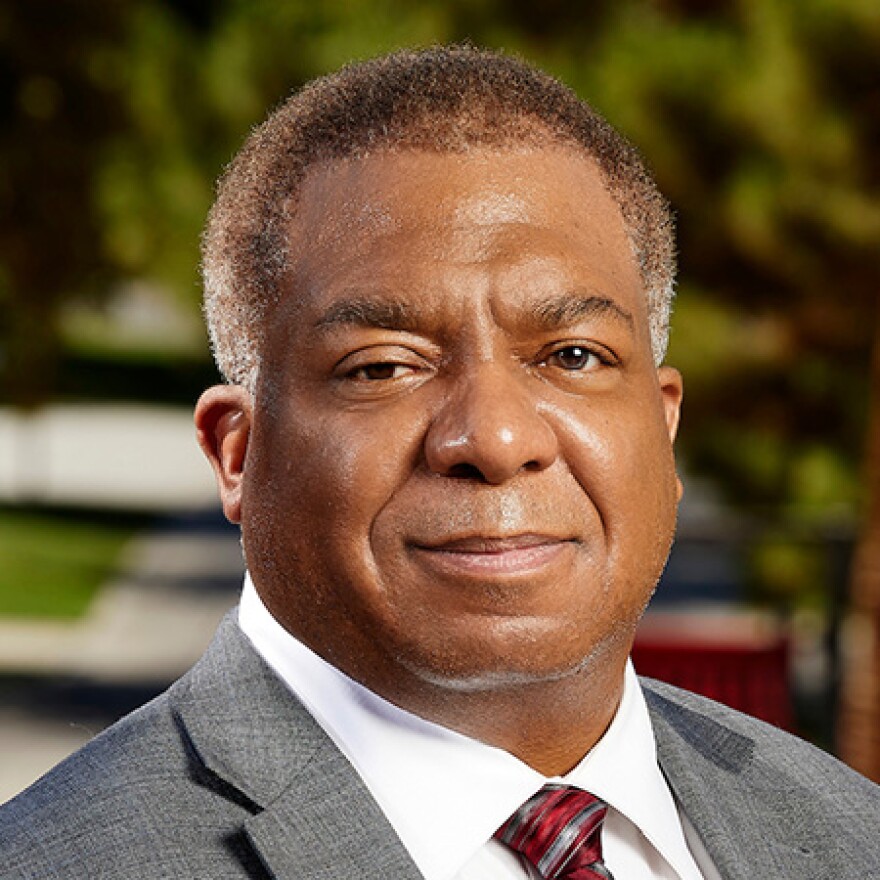Keith Whitfield took over as UNLV’s new president August 24.
He’s the university’s 11th permanent president, and the first Black president in the school’s 63-year history.
And he’s coming to UNLV at one of the toughest times in school history.
Even with hybrid online/in-person learning and safety guidelines in place, multiple COVID-19 infections have been reported on campus.
At the same time, the state cut funding to higher education during the summer’s special session by $110 million, with UNLV taking the brunt of the cuts.
And politics, especially race relations, are polarizing the country.
So, what’s his plan to handle it all?
When it comes to the coronavirus, Whitfield told KNPR's State of Nevada that when a case is reported the university contacts the person, contact traces where they have been, and if they believe they contracted the virus on campus, they look at the facilities the patient was in to make sure they can keep everyone safe.
As far as budget cuts, Whitfield said the university is doing what it can with the resources it has to fill in the gaps.
"We're trying to make a dollar out of 15 cents," he said.
Despite the budget cutbacks, Whitfield the university is still able to provide a quality education to the students. He said the school is working to take care of the faculty and staff, along with the facilities.
"We're trying to figure out ways to make sure we do the right kinds of things," he said, "We are going to make sure we are as fiscally sound and safe as we can be."
As an example, the university has instituted a hiring freeze.
The new president said he is already working on addressing what many people see as a long-standing divide between north and south, with more funding to going to UNR.
Whitfield said he is already communicating with the newly-appointed University of Nevada, Reno President Brian Sandoval.
"Going on in the future, I have a lot of hope," he said, "I like to be somebody who likes to collaborate... We've actually already communicated back and forth a couple of times and talked, 'Yeah, we need to think about ways in which we can actually lift up the state together, not this one versus the other."
He said the collaborative effort could also extend to other educational institutions in Southern Nevada to help educate students throughout the state.
Within the university, Whitfield would like to see more interdisciplinary connections. The university achieved an important goal in 2018 when it was designated a Tier One research facility. To keep that status, he would like collaboration among individual colleges.
"What we can do is to work with the people that we have here on the ground, which are these incredibly smart, capable people and encourage them where they can find intersections to be able to work together and that will increase the output in terms of research."
Whitfield said it doesn't cost extra money to create those connections. Instead, it is more about creating a university culture where it is encouraged.
He said another measure for research success is how a university graduates its doctoral students. One of his priorities will be to make pathways for students to achieve a doctoral degree.
Discussions happening around the country about racial injustice and equality are reflected back into the university. Whitfield said universities should be the epicenter of discussions on these topics.
"There's a lot of things that need to go on," he said, "One is in terms of making sure we take an accounting of our history, of where we've come and where we're at in this moment in time and then to think very strategically about how we want to go forward."
Whitfield noted that UNLV has created an Anti-Black Racism Task Force that is working on ways to address inequality and racism at the university and ways to move forward in terms of the campus' culture and the climate.
He believes institutions of higher education are a way to have difficult discussions and a place to talk about creating community.
Despite the challenges ahead, Whitfield is happy to be leading the charge at UNLV.
"This is an opportunity of a lifetime," he said, "I'm very appreciative of the faculty, the students, the staff, the regents, the community members that selected me for this position."
He said he is going to bring everything he has learned over his years as an educator and administrator to help the university make it through the difficult times.
Whitfield looks to President John F. Kennedy's famous statement that we don't do things because they're easy but we do things because they are hard, during these tough times.
"That's what I'm committed to," he said, "They're hard but at the same time I feel like I have so much support."
Keith Whitfield, president, UNLV









